 |
 |
 |
 |
 |
 |
|
|
||||
COLUMNS |
Contributors |
|||
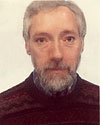 |
I come from Leeds. I did my first degree at the University of Cambridge, and then a Postgraduate Certificate in Education, during which I quickly abandoned my ambition to teach children in the UK state system. But at the end of that year I got a summer job teaching English as a foreign language to adults, found that I liked it, and I've never looked back since. I've lived in Poland since 1991. I live in As well as Inside Teaching (Macmillan), I'm co-author of The Pronunciation Book (Longman), one of the authors of Bridges (Klett) — an adult course for German-speaking learners — and the PONS Polish-English Dictionary (LektorKlett). At the moment I'm working on pronunciation materials for Polish and international readerships, and starting work on another Polish-English dictionary. I like studying languages and tracing connections between them, and I'm — still — intrigued by the question: Given that so many people in the world learn foreign and second languages informally, without books, teachers and so on, how can formal instruction help most effectively, as opposed to interfering with the learning process? I'm also keen on walking, travelling by train, photography, history, architecture, landscape, folklore and so on. I spend an enormous amount of time listening to music, and if I get reincarnated I want to be a musician next time round.
|
|||
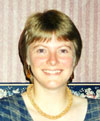 |
Kerry has a first degree in computational linguistics and an MA in theoretical linguistics from the University of Manchester, specialising in syntactic theory. For several years she worked as a researcher at Manchester and Essex universities, where in connection with European projects on machine translation, she was involved in computational lexicography, co-ordinating research in computational descriptions of compounds and collocations, and presenting her work in various international academic contexts. In 1993 she joined Cambridge University Press as a lexicographer/editor and grammar consultant, and worked on a large number of Cambridge learners’ dictionaries, including the English Pronouncing Dictionary, the Cambridge International Dictionary of Phrasal Verbs and the Cambridge Learner’s Dictionary in print and CD-ROM versions. In June 2001 Kerry moved to York where she now works as a freelance editor/lexicographer and is involved in a range of dictionary and grammar projects. |
|||
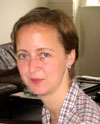 |
I don’t know how or when I became a lexicographer, though I think I have always been a linguist. My first degree, in Russian and French at the University of Reading led on to a postgraduate diploma in technical and specialized translation from the Polytechnic of Central London. A long spell of working as a translator, freelance and in-house, brought me to the realization that my passion for languages lay in the individual words themselves rather than in any finished documents I might produce and that translating, while a great discipline, would never allow me the time to ‘enjoy’ the words. I returned to academic study and an MLitt in Slavonic Studies at Cambridge University. There I spent my time analysing and enjoying the language and style of the short stories of Anton Chekhov and wondering how I would ever manage to make a living using my language skills. Freelance work at Cambridge University Press provided the answer and my first non-user experience of dictionaries. It was through my work on False Friends for the Cambridge International Dictionary of English that I came into contact with the Acquilex project – an international computational lexicography project on multilingual lexical databases. Two years of working as a research assistant on Acquilex provided me with an excellent apprenticeship and finally sealed my fate (in career terms). Since the end of the Acquilex project in 1995 I have worked as a freelance linguist/lexicographer and revelled in the variety and flexibility this role offers. I have worked on highly commercial software development projects as far away as Silicon Valley in California, on academic research projects closer to home and in Hong Kong and the US and on a variety of dictionary publishing projects, including learner corpora, learners’ and native-speaker dictionaries and thesauruses (CUP, Bloomsbury, OUP, Macmillan). Among other things, I seem to have found a niche in developing and executing categorization and coding systems and can usually be found wading up to my neck in words, trying to marshal them into some sort of order while secretly admiring their slipperiness. Writing articles for the MED resource site provides me with an opportunity to get a few things off my linguistic chest and express some of my admiration for the things that words can do and the problems they can cause their users. I live in Hackney, London with my husband, Rory. |
|||
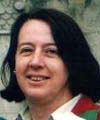 |
Like most people who write dictionaries for a living, I became a lexicographer by accident. After several years working in Italy and Scotland as an ELT teacher and course organiser, and as a translator and teacher of Italian, I was looking for a change. In 1990, a friend spotted a job ad for bilingual lexicographers at Longman. I applied and got the job, and discovered something I had never suspected – that dictionaries are written by people like me. After two years at Longman, I moved to COBUILD, where I worked on monolingual learner’s dictionaries. Since leaving COBUILD in 1999 to work freelance, I have contributed to a variety of monolingual and bilingual learner’s dictionaries, and I also write a weekly Web article on English. When I’m not slaving over a hot dictionary entry, I like to spend my time gardening, and enjoying the company of my husband and two children. I also sing in a choir and go to yoga classes, though despite many years of trying I still can’t manage the lotus position. |
|||
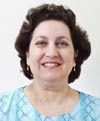 |
Rosemary Richey is a freelance Business Competency Consultant for training and material development. With a MATESL from the University of Texas, Rosemary combined her eight years of hotel management with language teaching qualification to specialize in Business English training. She worked for four years at the British Council, Damascus doing both business and teacher training in Syria and Lebanon. Rosemary has been based in Munich, Germany since 2001. Dealing with in-house company training, she specializes in Customer Care, Human Resources/ Personnel, Company Finance and Hotels/Tourism. She is authoring English for Customer Care for Cornelsen Verlag in Berlin which is due out in 2004. Rosemary is also a contributor to Macmillan’s In-Company Upper-Intermediate Teacher’s Book and onestopenglish website along with Business Spotlight magazine. You can contact Rosemary at rfhrichey@hotmail.com.
|
|||
| Meet the Editor | ||||
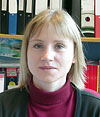 |
Kati
Sule
Kati was born in Hungary. She studied English Language and Literature at the University of Szeged in south-east Hungary and also completed an ELT degree, writing her dissertation on the role of monolingual dictionaries in ELT. She taught English as a foreign language in Hungary and briefly in the Netherlands. Kati has worked as an ELT editor since 1999. She has been involved in the Macmillan English Dictionary and Macmillan Essential Dictionary projects, and was editor of the Macmillan English Dictionary Workbook. She has also worked on the CD-ROM edition of MED and Essential, and is one of the editors of the Macmillan English Dictionaries resource site. |
|||
|
Cover photographs © Getty Images/Brand X Pictures
(new words); |
||||
|
|
||||